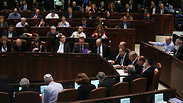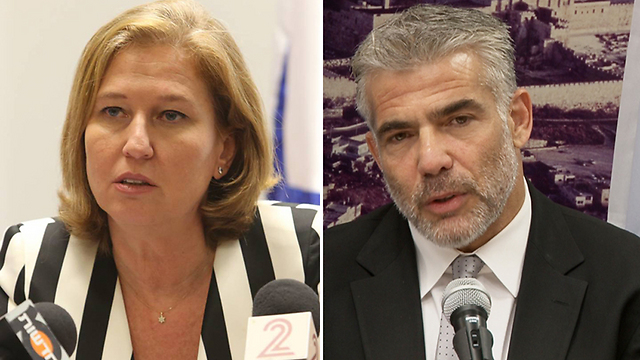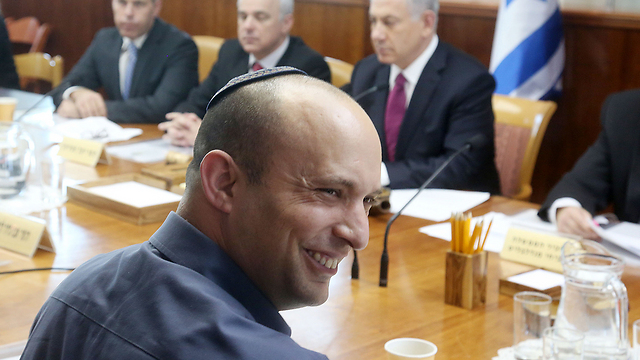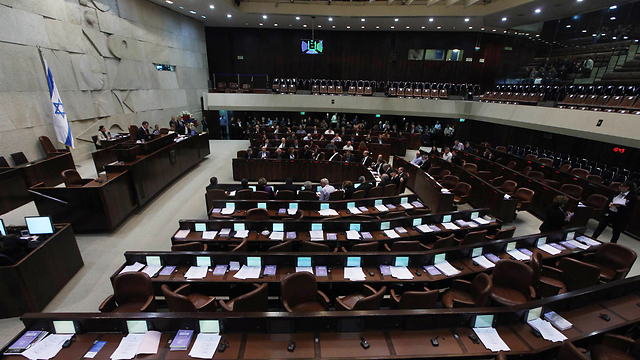
Conversion, house prices and Abbas: stormy winter session awaits Knesset
Netanyahu faces numerous challenges from key coalition members as they tackle legislation on peace process, court powers.
The Knesset winter session got underway Monday with a series of pressing issues on the agenda. But as MKs prepare to tackle a contentious conversion law, a stagnant peace process, and the prospect of new protests over the cost of living, the Netanyahu government seems primarily concerned with its survival as the threat of a collapsing coalition raises the possibility once again of early elections.
Netanyahu on Monday approved the construction of more than 1,000 housing units in East Jerusalem, even as tensions in the capital have spiralled in recent weeks. The move was seen to be an attempt by the prime minister to placate his rightwing base as the new session began.
Tensions were already high Monday morning with the first meeting of the Constitution, Law and Justice Committee, when committee chairman MK David Rotem of Bayit Yehudi announced he would open the debate on the Conversion Bill that has divided the coalition.
The bill seeks to ease the process of conversion to Judaism by allowing rabbis of Israeli cities to authorize conversions, essentially removing control of the process from the Chief Rabbinate.
The bill is considered a flagship bill of Justice Minister Tzipi Livni's Hatnua party, and Netanyahu announced his opposition to it last week. In response to the prime minister's moves to crush the bill, Hatnua MK Elazar Stern threatened to quit the coalition if the bill were not passed, saying he would raise the issue in the Knesset plenum without government consent.
The conversion issue is one concern within the broader topic of religion and state issues that spark a crisis in the coalition whenever they are tabled.
Another issue at hand is the peace process. At least two senior coalition partners, Finance MInister Yair Lapid and Livni, have conditioned their future in the government on the continuation of the peace process.

Other coalition members such as Economy Minister Naftali Bennett of Bayit Yehudi, and a large part of the Likud, no longer believe in the peace process and will do everything in their power to continue building settlements and persuade the Israeli public that Palestinian President Mahmoud Abbas is not a true partner for peace.
The peace process, whether it comes up on the agenda of the current session or not, will be explosive on both sides of the political map.
Another set of laws to be brought to the agenda, mainly by the right-wing, set to redefine the relationship between the Knesset and the High Court.

Following the rejection of the Infiltration Law and the demand by the High Court for a new bill, prominent MKs, led by Bayit Yehudi's Ayelet Shaked, have already announced their aim to curb the power of the High Court and to return sovereign influence to the Knesset.
Not all Knesset members are in favor of Shaked's bill, which seeks to enable the Knesset to reenact laws overturned by the High Court. Livni has said that right-wing legislation initiatives such as these constitute a serious blow to democracy. Lapid's Yesh Atid party has a similar stance.
In addition, a final decision is to be made concerning the 0% VAT Bill initiated by Lapid, which seeks to exempt first-time apartment owners from VAT on properties of up to NIS 1.6 million.
Despite a significant delay in the approval of the bill due to disputes and disagreements, the bill is expected to pass a second and third reading during the beginning of the winter session.
Further on the agenda of the session, Knesset members are expected to spend long nights debating the state budget for 2015, which looks set to be decided in early December.
The question of early primaries in the Likud is another issue that will arise during the session. Likud Chairman Danny Danon will push for the primaries to take place on January 28, 2015, against the will of Netanyahu who has requested primaries in November or early December at the latest.
Last week, speculation arose Netanyahu was pushing for early national elections to take place in the spring, and had planned to make concessions to Bennett and the opposition religious factions to gain support.
After Netanyahu announced he would not seek early elections, tensions could rise in the Netanyahu-Bennett and Netanyahu-Haredi camps.











